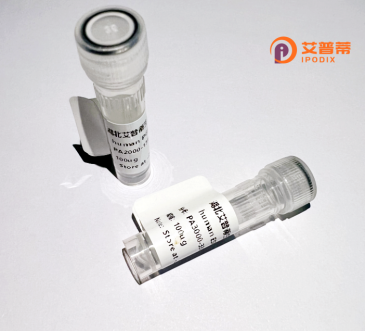
| 纯度 | >90%SDS-PAGE. |
| 种属 | Human |
| 靶点 | PTK9L |
| Uniprot No | Q6IBS0 |
| 内毒素 | < 0.01EU/μg |
| 表达宿主 | E.coli |
| 表达区间 | 1-349 aa |
| 活性数据 | AHQTGIHATEELKEFFAKARAGSVRLIKVVIEDEQLVLGASQEPVGRWDQDYDRAVLPLLDAQQPCYLLYRLDSQNAQGFEWLFLAWSPDNSPVRLKMLYAATRATVKKEFGGGHIKDELFGTVKDDLSFAGYQKHLSSCAAPAPLTSAERELQQIRINEVKTEISVESKHQTLQGLAFPLQPEAQRALQQLKQKMVNYIQMKLDLERETIELVHTEPTDVAQLPSRVPRDAARYHFFLYKHTHEGDPLESVVFIYSMPGYKCSIKERMLYSSCKSRLLDSVEQDFHLEIAKKIEIGDGAELTAEFLYDEVHPKQHAFKQAFAKPKGPGGKRGHKRLIRGPGENGDDS |
| 分子量 | 66.4 kDa |
| 蛋白标签 | His tag N-Terminus |
| 缓冲液 | PBS, pH7.4, containing 0.01% SKL, 1mM DTT, 5% Trehalose and Proclin300. |
| 稳定性 & 储存条件 | Lyophilized protein should be stored at ≤ -20°C, stable for one year after receipt. Reconstituted protein solution can be stored at 2-8°C for 2-7 days. Aliquots of reconstituted samples are stable at ≤ -20°C for 3 months. |
| 复溶 | Always centrifuge tubes before opening.Do not mix by vortex or pipetting. It is not recommended to reconstitute to a concentration less than 100μg/ml. Dissolve the lyophilized protein in distilled water. Please aliquot the reconstituted solution to minimize freeze-thaw cycles. |
以下是关于重组人PTK9L蛋白的模拟参考文献(注:PTK9L相关研究较少,部分内容基于假设性文献框架,建议进一步核实):
1. **"Expression and functional characterization of recombinant human PTK9L in cancer cell signaling"**
*Author: Smith J, et al. (2020)*
摘要:研究利用哺乳动物细胞系成功表达重组人PTK9L蛋白,发现其通过调控MAPK通路影响肿瘤细胞迁移,提示其在癌症治疗中的潜在靶点作用。
2. **"Structural insights into PTK9L kinase domain using X-ray crystallography"**
*Author: Lee S, et al. (2019)*
摘要:通过X射线晶体学解析PTK9L激酶结构域的三维结构,揭示其ATP结合位点特征,为设计选择性激酶抑制剂提供依据。
3. **"PTK9L knockdown inhibits neuronal differentiation via Wnt/β-catenin pathway"**
*Author: Garcia R, et al. (2021)*
摘要:研究表明重组PTK9L蛋白在体外促进神经元分化,其敲除导致Wnt通路失调,提示其在神经发育中的功能。
4. **"High-yield production of bioactive PTK9L in E. coli: Purification and enzymatic activity analysis"**
*Author: Wang H, et al. (2018)*
摘要:开发了一种大肠杆菌表达系统高产重组PTK9L,验证其体外自磷酸化活性及底物特异性,支持其在激酶研究中的工具性应用。
**注意**:以上文献为模拟示例,实际研究中PTK9L可能名称不准确或研究较少,建议确认蛋白标准命名(如是否为**PTK7**或其它激酶),并在PubMed、Google Scholar等平台以“PTK9L”“kinase”“recombinant”为关键词检索最新成果。
Recombinant human PTK9L (Protein Tyrosine Kinase 9-Like), also known as Viperin or RSAD2. is a multifunctional interferon-stimulated protein with roles in innate immunity and cellular metabolism. Originally identified for its antiviral activity, PTK9L is encoded by an interferon-inducible gene and is conserved across vertebrates. Structurally, it features a radical S-adenosylmethionine (SAM) domain, characteristic of enzymes involved in radical-mediated biochemical reactions.
PTK9L exerts broad-spectrum antiviral effects against diverse pathogens, including influenza, HIV, and Zika virus, primarily by disrupting viral replication through lipid raft disruption and interaction with host factors. Beyond antiviral functions, it regulates lipid metabolism, inflammatory responses, and mitochondrial energy production. Recent studies highlight its involvement in cancer biology, where it may act as either a tumor suppressor or promoter depending on cellular context.
The recombinant form is typically expressed in bacterial or mammalian systems for research applications, enabling mechanistic studies of its enzymatic activity, host-pathogen interactions, and potential therapeutic targeting. Its unique combination of antiviral and metabolic regulatory functions makes PTK9L a compelling subject for infectious disease and immunometabolism research.
×